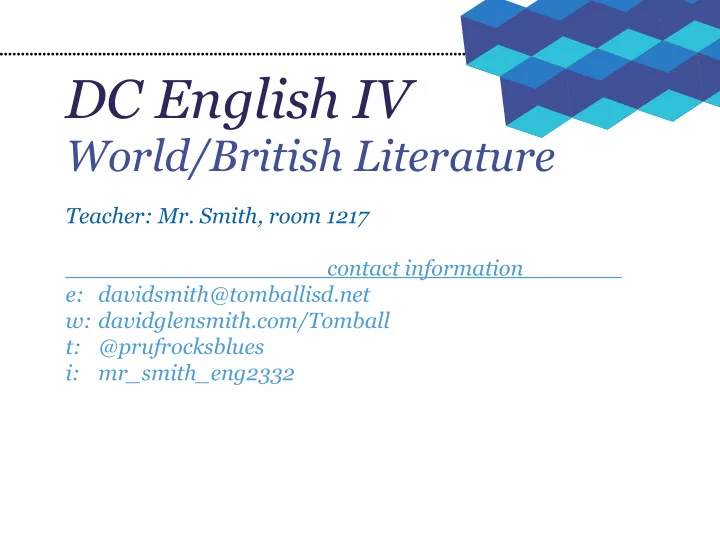

DC English IV World/British Literature Teacher: Mr. Smith, room 1217 contact information e: davidsmith@tomballisd.net w: davidglensmith.com/Tomball t: @prufrocksblues i: mr_smith_eng2332
René Descartes (1596-1650) René Descartes • considered the Father of Modern Philosophy • born to an aristocrat family in France • educated at a Jesuit boarding school Discourse on the Method of Rightly Conducting One’s Reason and Seeking Truth in the Sciences, 1637 • French: Discours de la Méthode Pour bien conduire sa raison, et chercher la vérité dans les sciences • Completed in 1637; translated to Latin 1656 • In full, it exists as a philosophical treatise • Helped develop the natural sciences and opened up the era of Rationalism • First and most famous work • Established famous line, in Latin: Cogito ergo sum “I am thinking, therefore I exist.” 2 08.02.20 || English 2332/2333 || D. Glen Smith, instructor Tomball High School
René Descartes (1596-1650) Discourse on the Method of Rightly Conducting One’s Reason and Seeking Truth in the Sciences, 1637 • Divided into six parts .: Part 1 discusses various importances of the sciences and provides an autobiographical opening .: Part IV aims to prove the existence of God and the Human Soul • Other portions of the text establish his thoughts on Cartesian Dualism • Despite his religious leanings, the Catholic Church disliked his establishment human reason over religion / divine mystery 3 08.02.20 || English 2332/2333 || D. Glen Smith, instructor Tomball High School
René Descartes (1596-1650) Some Basic Principles from Discourse on the Method * • argues that thought and reason are the essence of humanity .: these qualities separate humans from “lower animals” • for thoughts to exist, there must be a source to do the thinking • reason is a natural talent gifted to humans • sensory perception (and therefore empiricism) is unreliable and can be mislead • humans are thinking “things” • perception and imagination exist do not necessarily hold any truths, but are essential to humanity God Exists* • since God is perfect, it is impossible for God to deceive someone • despite the fact humans are imperfect (including Descartes), the fact that we/he can conceive of the notion of perfection means perfection must exist; and this perfection is God Kleinman, Paul. Philosophy 101. Adams Media. New York, 2013, pp. 113-114. 4 08.02.20 || English 2332/2333 || D. Glen Smith, instructor Tomball High School
René Descartes (1596-1650) • After the establishment of the Catholic Church and its acquisition of an overwhelming power, theorists and logicians were forced to use religion as a basis of philosophy. • Descartes separated faith from reasoning by using a concept termed Methodical Doubt . • Humans are allowed doubt as a means for rationalizing the existance of God. What Eventually Resulted: Religion (faith) Philosophy (intellect) cannot ask questions must ask questions accept all without facts denies assumptions without facts answers that cannot be questioned questions that cannot be answered 5 08.02.20 || English 2332/2333 || D. Glen Smith, instructor Tomball High School
Recommend
More recommend